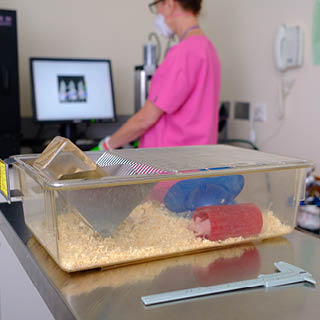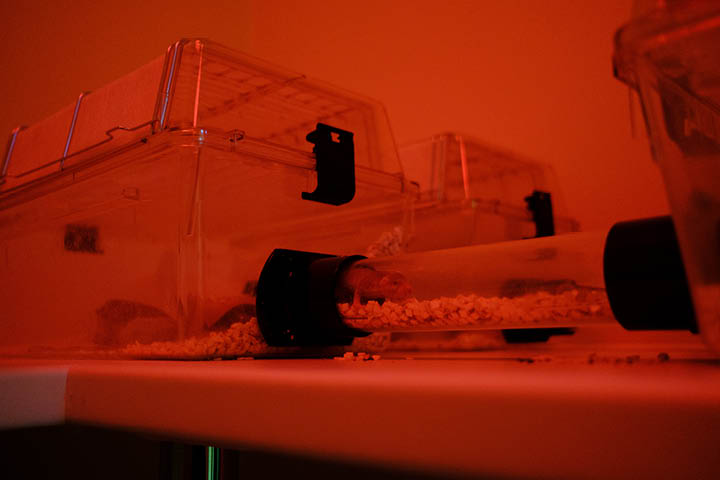
Biological Services Unit
The Biological Services Unit (BSU)
The Biological Services Unit (BSU) is a purpose-built research facility that houses all research involving live animals on the University of Bradford campus. The BSU is staffed by a small team of animal care professionals and supported by responsible Named Persons. See below for more details of work undertaken in the BSU and information on how it is regulated.
Our use of animals in research
The University of Bradford is proud to undertake pioneering research which has global impact in advanced healthcare. Although much of the research carried out at Bradford does not involve animals, there are times when the use of animals is essential to achieve a specific research objective. On these occasions the University adheres rigorously to the requirements of The Animals (Scientific Procedures) Act 1986 and works in line with our strategic value to apply the best ethical standards in everything we do.

Why use animals?
Work involving animals only makes up a small proportion of research carried out in the UK, it is not legal to use an animal if there is any suitable alternative and it is never legal to use animals for cosmetic testing. Usually animal experiments are conducted in conjunction with other non-animal techniques such as the use of cell and tissue cultures, computer modelling, or use of human participants. However, if there is a need to study complex processes such as the relationship between different organs, how the body delivers or breaks down substances, or how a genetic alteration affects all of the cells of a living organism then it may be necessary to work with animals. In the case of drug development, there may also be a legal requirement to work with animals before treatments can progress to testing in humans. In all cases there is a strict process for consideration of the cost to the animals and the potential benefit, as well as ensuring that the same information could not be found without the use of animals, that the minimum number of animals, and the most refined techniques are used. Everyone involved with animal research has a responsibility to ensure the implementation of “The 3Rs”.
.jpg)
The 3Rs
The principles of the 3Rs (Replacement, Reduction, and Refinement) were developed to provide a framework of more humane animal research and are embedded in the legislation and regulations on the use of animals in scientific procedures. The University of Bradford is committed to explore ways in which we can:
REPLACE animals wherever possible with alternative models for research such as with human volunteers, tissues taken (with consent) from human patients during operations, cell and tissue cultures, and computer simulations.
REDUCE the number of animals involved per experiment whilst ensuring that studies are designed to produce robust and reproducible findings this could include simple steps such as sharing of tissue or data, or through following reporting guidelines such as ARRIVE to prevent duplication of experiments.
REFINE those procedures that are necessary, in order to minimise pain, suffering, distress or lasting harm to animals, for example ensuring that housing allows animals to express a full range of normal behaviours, provision of effective pain relief, or handling and training animals to cooperate with procedures to minimise distress.
-1.jpg)
What research involves animals at University of Bradford?
Animals are used in research at the University to assist the understanding of diseases, and at the same time to find or improve treatments including the development of anti-cancer drugs, the treatment of skin conditions and tumours, the treatment of cognitive dysfunction, and to investigate neuroendocrine mechanisms.
Academics work collaboratively across research centres such as the Institute of Cancer Therapeutics and Centre for Skin Sciences, as well as within themed groups. Some projects involving the use of animals, or their tissues include;
Aging and Dementia
Research involving the brain extracellular matrix (ECM) and the study of how the structure and development of the ECM changes with age, as well as how it is dysregulated in neurodegenerative disease such as Parkinson’s. A current study is looking at the benefits of reverting aged EMC to a youthful state in treating spinal cord injury and dementia.
Metabolism and neuroendocrinology
Research based in the hypothalamus of brain, investigating circadian rhythms and how disruption of the circadian rhythm affects energy balance regulation. In addition to this there are current studies observing the differing affects of medium and long chain fatty acids and appetite regulation and metabolism.
Metabolism and endocrinology
Research is currently being conducted in pancreatic beta cells to observe whether medium chain fatty acids have any beneficial affects on insulin synthesis, transport, and exocytosis compared to the known glucolipotoxicity of long-chain fatty acids and elevated glucose levels.
Reproductive biology
Research exploring how genetic and environmental factors influence the development of gonadal tumours from embryonic cells, and the molecular pathways that govern the sensitivity of tumours to chemotherapy.
Cancer metastasis and Genomics
The overarching goal of this research group is to understand how cancer cells spread (metastasis) and identify novel translatable pathways/targets to treat metastatic disease.
Annual usage figures for animals used at University of Bradford under The Animals (Scientific Procedures) Act 1986
The University of Bradford is a small rodent only facility and fluctuations in animal numbers reflect changes in researcher demand. Efforts are always made to share tissues both internally and with external collaborators.
|
Animal |
2019 |
2020 |
2021 |
2022 |
2023 |
|
Mice |
497 |
228 |
576 |
295 |
352 |
|
Rats |
82 |
0 |
18 |
0 |
0 |
|
Naked Mole Rats |
56 |
41 |
14 |
0 |
0 |
Annual figures by severity limit (as defined by ASPA)
|
Severity |
2021 |
2022 |
2023 |
|
Mild |
166 |
26 |
101 |
|
Moderate |
436 |
267 |
244 |
|
Severe |
6 |
2 |
7 |
Regulation of work involving animals
All research involving living animals is regulated by The Animals (Scientific Procedures) Act 1986 (ASPA) and enforced by the Home Office through a process of licensing and inspections. Three different licences are required before any work can begin;
Procedure Establishment Licence (PEL) – the PEL is held by a member of the Senior Management Team and makes them accountable for ensuring that the standards set out in The Act and associated Code of Practice are met. This includes animal accommodation, environmental conditions, and staff training. The PEL lists suitable “Named Persons” who have specific responsibilities to advise all licensees and support the PEL Holder in meeting the requirements of The Act. The PEL Holder has primary responsibility for the conduct of all other licence holders and Named Persons.
Procedure Project Licence (PPL) – the PPL is held by the Principal Investigator and describes the programme of work. The application process requires the Principal Investigator to explain why the work could not be completed without the use of animals, describe the severity of each procedure, what steps are being taken to reduce severity, and what the expected benefits of the project are. The Home Office and Ethical Review Panel use this information to decide if the work can be justified. The PPL Holder has primary responsibility for the overall programme of work and the conduct of those working under their PPL.
Procedure Individual Licence (PIL) – the PIL authorises individuals who have undertaken the necessary training to carry out specified procedures on specified species of animal. The PIL Holder has primary responsibility for all animals which they have performed procedures on.
Named Persons – the PEL names a number of individuals who have responsibility under The Act for providing guidance and support to licence holders. This includes a Veterinary Surgeon (NVS), an Animal Care and Welfare Officer (NACWO), a Training and Competence Officer (NTCO), and an Information Officer (NIO). All of these individuals are required to keep updated on changes to the regulations and best practice, and to encourage the implementation of a culture of care throughout the establishment.
Animal Welfare and Ethical Review Body – each licenced establishment must have an Animal Welfare and Ethical Review Body (AWERB). The role of AWERB is to advise licence holders on all matters related to the welfare of animals, the application of the 3Rs, the review of operational and management processes, and to follow the development and outcome of projects carried out at the establishment.
Membership of our AWERB includes all of the Named Persons, a selection of licence holders, a number of scientific members with no responsibilities under The Act, and a selection of Lay Members, some of whom are external to the establishment. Currently Lay Members make up one quarter of the group.
The AWERB meets quarterly and a standard agenda includes reports from all Named Persons, consideration of applications for new licences, amendments to licences, mid-term and end of project reviews, and discussion on a range of topics including security, openness, and training. Once in each academic year an Effectiveness Review takes place to consider if the AWERB is meeting with its responsibilities under The Act.
The University also holds an annual Knowledge Share Event to provide updates and training to the User Group – previous training topics have included Openness, Security, Research Impact, and Collaboration.
Further information
- See the AWERB Annual Summary Report 2023
- GOV.UK - Animal Testing & Research Guidance
- National Centre for the Replacement, Refinement & Reduction of Animals in Research (NC3Rs)
- NC3Rs Revision of the ARRIVE Guidelines
- Institute of Animal Technology (IAT)
- Laboratory Animal Science Association (LASA)
- Understanding Animal Research
Press enquiries contact details
For general enquiries about research at Bradford or to request comments from an academic expert on a specific subject please contact the media relations team, or for specific questions relating to animal research at University of Bradford, please contact the Freedom of Information team.
Research integrity and whistleblowing
The University of Bradford expects its staff to undertake research that all those involved in its undertaking can have trust and confidence in. Our research is expected to be conducted honestly and professionally, and should adhere to regulations and expected standards. For more information please see the Research Integrity pages.
